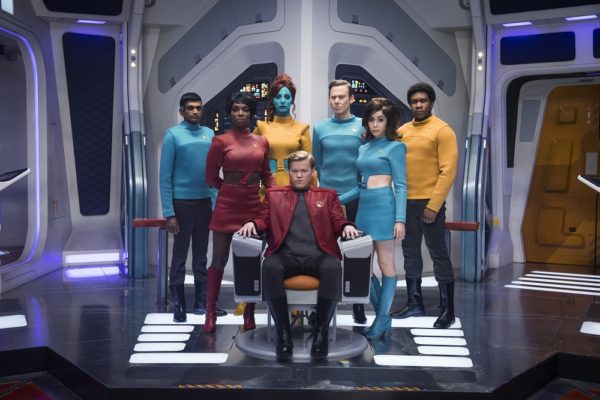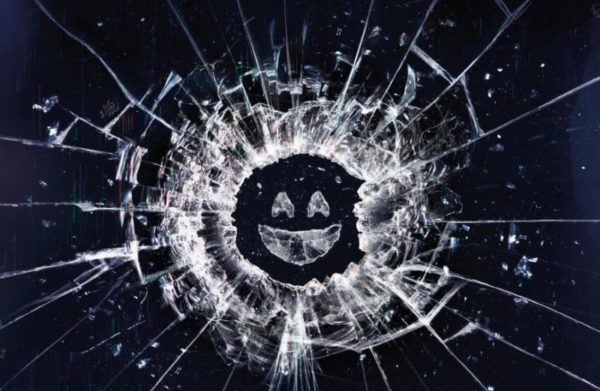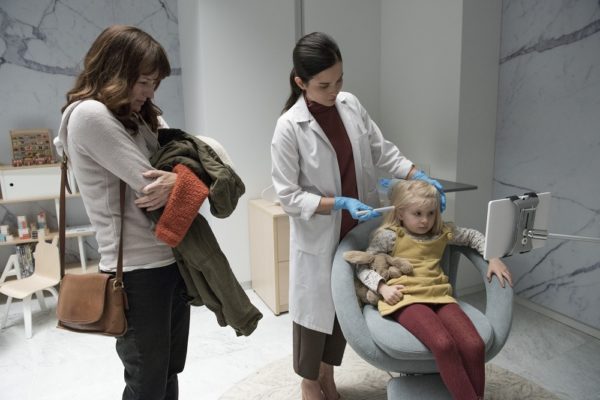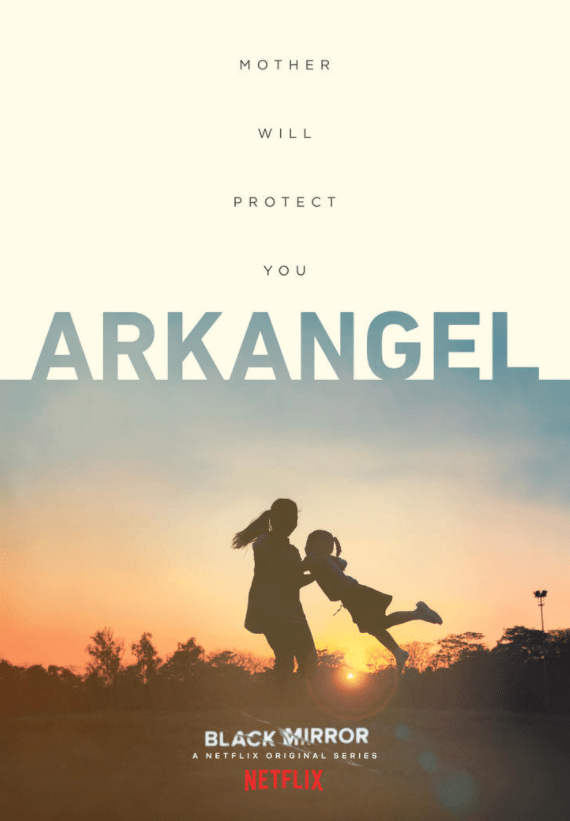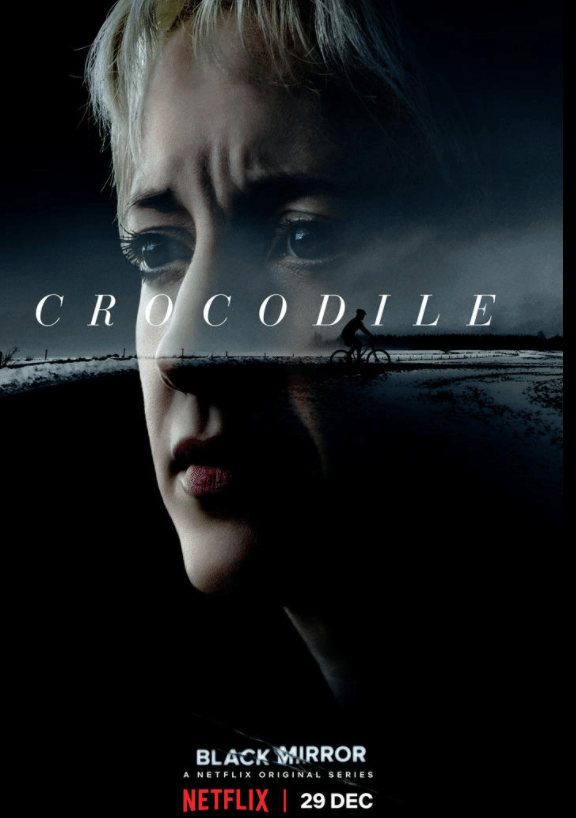In the run up to season four of Black Mirror we were lucky enough to sit down with writer/producer Charlie Brooker and showrunner Annabel Jones. Who gave us their thoughts on advancing technologies, their unique writing process and how the series has evolved since moving to Netflix.
So you have obviously worked together for some time, how did you get to know each other?
AJ: We don’t know each other.
CB: This is literally the first time we have met (laughter)
AJ: We started working together seventeen years ago and just happened to be in the same building.
CB: Which was a weird place to work, and ended up working in the same company, and then you were the boss, and then so all the shows I’ve been involved with Annabel has been there as well. So all the sort of ‘Wipe’ shows and ‘Deadset’ and things like that. So we’ve always sort of worked together. (laughing)
AJ: We’re always so busy discussing other things that we never really discuss it ourselves which is a bit odd.
Thank you for ‘USS Callister’, I think it’s my favourite ‘Black Mirror’ and feels like the flagship of this season the same way ‘San Junipero’ was in the last season. I was just wondering whether ‘San Junipero’ influenced it in any way?
CB: Yes and no, in that it’s really hard to say which one is the flagship, because everyone has different favourites. So you guys have seen two episodes and so far I think of the people we have spoken to, they seem split as to which one is their favourite. Which is interesting and then there are another four you haven’t seen. And they are all very strong flavours this time around. But certainly ‘San Junipero’ influenced the decision because that was the first episode which was written for Netflix generally anyway, was the first episode of season three which was written, it was a conscious decision to try and experiment and expand what the show was and up end what the show is.
CB: And so ‘USS Callister’ is very dark in places but has moments of comedy that you maybe wouldn’t have expected, I think, like a few years ago from ‘Black Mirror’. So ‘San Junipero’ because we were pleased with the way turned out, I think it gave us the confidence to say, right we can play with the tone more than we have before. So certainly in that respect we were ‘so what haven’t we done yet?, we’ve done the Eighties and we didn’t think we could do the Eighties, can we do space’.
AJ: But often there are lots of things colliding and you know you’re either talking about a particular topic, or a theme, or a ‘what if’ scenario and sometimes they all just collide and Charlie will have one moment of ‘I’ve got it’ and it all comes together and you have a story. But sometimes it’s very different so they all evolve very differently. But in terms of flagships its interesting because if, and Charlie is absolutely right, we don’t think of any one episode as being a flagship, because if we did then we haven’t done our job properly, because all six should be great and all six should engage people in different ways and everyone should have a different favourite, because that’s an anthology show.
And do you have a favourite from this season?
AJ: I don’t, I don’t (smiling)
CB: That’s like asking, which is your favourite child.
AJ: Or favourite piece of music because we all play different music to play different moods and reflect different moods, so we can only offer up the films we think are the most compelling stories and it’s for everyone else to react to them.
Do you think the series has changed at all since it’s become a purely Netflix show. Has the influence or non-influence of Channel 4 changed anything?
AJ: No, I think it’s more about the breadth of the series going from three episodes to six, suddenly you can explore and push the perception of what the show is without breaking it. As Charlie has already explained we did ‘San Junipero’, which has very upbeat endings and the bittersweet ending and aesthetically it’s very very different. And so we could do that because at the same time we were doing ‘Shut Up and Dance’, which is a very domestic, small, and grounded kitchen sink drama and those two can co-exist within a run of six. Whereas suddenly if you’re in a run of three they feel more exposed. So I think it’s about the number of episodes we’ve been doing, also I think on the Netflix platform you can experiment with duration, you can tell much bigger stories like ‘USS Callister’ which fits a feature structure.
It’s like an hour and fifteen or something like isn’t it.
CB: Seventy four minutes (laughter)
AJ: And then we have ‘Metalhead’ in the run this current season which I think is about forty minutes.
CB: Thirty eight minutes (laughter from the whole table)
AJ: (Trying not to laugh) You want to know more about running orders.
CB: I’m the man
AJ: So I think the length of the run has allowed us much more freedom to tell different stories.
Can you talk us through the writing process? What makes a good Black Mirror idea, what makes a bad one? Where are you getting your inspiration from?
CB: Well it really varies because what generally happens is it’ll start with. We will be discussing an idea and usually we’re going (hushed tones) ‘Oh God we’re got to do another episode, what are we do?’, and often we’ll be discussing something, it could be an issue like parenting, or just an observation on life and then at some point, there’ll be a ‘what if’ idea that occurs and then we’ll ping pong it back and forth and I’ll be trying to think of the worse possible outcome, and Annabel is challenging me going ‘that wouldn’t happen because’ and I’m like ‘yeah no it would’, then at the point where I realise I can’t shut up and you’re going ‘oh that sounds horrible’ that’s when we sort of think ok we’ve got somewhere here, then there will be a point where you get excited about the idea. And then write up a brief treatment that’s a couple of pages that outlines the story and send that off to Netflix, they come back with feedback on that. Then I go off and I write the first draft, sometimes that can take two three days, sometimes it can take two or three weeks or a month, its random and I can’t predict what’s going to happen. Then I email it to Annabel and you pull it apart, but in a good way. It’s a thing every writer has to go through where you sort of write this thing and then you hand it over and you get notes back and you get really defensive like ‘I know, I know, I’m not saying it’s perfect’.
AJ: And then I give it a mark.
CB: Then you give it a mark out of ten. And so then we go back.
Do you literally?
CB: No, (laughing) not yet, don’t put ideas in her head. And then sometimes you rip it up and you start again. Now that has happened several times and you just go ‘oh Christ it’s not working’ or you literally park it and you go ‘well I’m stuck on this one, so I’m going to write another one’.
AJ: Not very often though. I don’t think we’ve abandoned (many).
CB: No, well ‘Hated In The Nation’ I wrote half of it and I was like ahhhhh! And I put it in a drawer and came back and finished it off.
AJ: I didn’t put it in a drawer.
CB: No you kept encouraging me to go back to it. And so, but when the director comes on board and then the cast come on board again it changes again, so Jodie Foster had lots of thoughts and suggestions on ‘Arkangel’ for instance, so you go back and re-draft it, or I think I was saying about ‘Crocodile’ was originally written with a male lead and we sent the script to Andrea Riseborough and she was reading the script to look at one of the other roles, and she came back saying ‘well actually I’d like to play this part, please’.
AJ: She hadn’t played that kind of role before and she thought ‘this is a real challenge for me can I get into that mind set?’
CB: And we sort of thought about it, discussed it, and said that’s interesting we hadn’t thought of that, so you go back and you change other aspects of it to suit that set up. And so by the time you get to the end, as more and more people get involved on it, it gets more and more flesh on its bones. So my job at the start when I’m writing the script is describe what I think the finished programme with be. Basically what I do is imagine it, write it down and it transforms throughout the process as everyone comes in and alters it and puts in lots of suggestions and luckily I’ve found that now when I get to the end, I can’t remember what it looked like originally in my head because the finished product has now got so many things I wouldn’t have thought of added to that skeleton.
You mentioned Jodie Foster, did you give her ‘Arkangel’ or did you give her a choice of scripts. How did she get involved?
AJ: No. When we’re thinking about directors we want there to be that variety of look and vision across the episodes, so we very carefully think about who is going to direct each episode. And also what we think they are going to relate to, because we are not a feature so we don’t have years of development and years of time to plan everything. So we are that hybrid and we are a TV schedule, so often you have to be quite quick, you have to respond to who’s available. But with Jodie we thought from the outset that of all the people who understands privacy and understands being in the spotlight and how you control your profile and how you exist in the world, she would relate to that. And so she has a good relationship with Netflix from having directed ‘House of Cards’ and ‘Orange Is The New Black’, so they’d read the script and thought ‘we think Jodie would really like this and it would really resonant with her’. They sent her the script, she loved it, we chatted and you have that open conversation about how someone reacts to the script, and we were ‘all on the same page’ as they say and then we started. We were obviously thrilled because…
CB: It’s Jodie fricking Foster.
AJ: But we were so flattered because she doesn’t really take on that many directing jobs because she can do anything, but she is just very selective because she’s a mum and she doesn’t want to be away from her family, so she only goes away when there’s a piece of work that really grabs her. And also being a child actor of course, she understands how to work with actors but also understands how to work with child actors. And it was a pleasure to see her on set and getting these great performances from the daughter in ‘Arkangel’, who goes from a baby up to the age of sixteen. So she had to work with lots of female child actors to get to that place. And she just has a short hand and a generosity that helps actors find their performance, in a laid back and casual manner which are just so different from other sets which don’t allow for that time pressure. It was a privilege.
There are obvious world events going on at the minute. Are there any you have to particularly ignore like Brexit, where you are like ‘I’m not going to go near that’ because by the time it comes out or the things surrounding Trump maybe?
CB: Well Trump we did weirdly when we did ‘The Waldo Moment’. It’s interesting because ‘Arkangel’ was written just after the Brexit vote happened that’s how long ago, so you can’t be that topical because it’s like an ocean liner that takes a while to turn around. And with that sort of thing you think, well I don’t know how the world is going to be in a year and a half’s time. You don’t want to be talking about eighteen months ago when you premiere. So we don’t; it’s not like we shy away from it but generally that’s not where the ideas come from anyway. We don’t tend to go ‘oh Brexit has happened’ or ‘Trump’s been elected what’s our story idea?’ That’s not where the ideas come from. Now sometimes when we are doing a story it resonates with something which is going on in the real world, but that’s often I guess a coincidence, or it’s accidental, or it’s because that stuff was in the ether. ‘The Waldo Moment’ is a good example where actually it was sort about Boris Johnson being on panel shows. Which seemed to tap into something, that then down the line became more of a global thing than we probably realised at the time. But we don’t tend to look at the news pages or the technology pages and draw ideas from there, it comes from ‘what if’ you could see through into your dreams.
A few days ago Aldi announced their doing a 3D printer for Christmas for a shade under three hundred pounds. Could you see trouble ahead with that concept in terms of accessibility to this kind of technology?
CB: Well you can’t put progress back in the box that’s the problem because it won’t fit. If you’ve ever tried to put an iPad back in the box you can’t even do that. So, I think that there are a bewildering number of things we are having to grapple with at the moment. And it’s weird because things fall into our lap and then we have to work out what the social rules are basically. And I was using an analogy earlier which I think is a good one which was the motor car. So the motor car came out and obviously it revolutionised transport and was a good thing. There were cars, but it took us a while to learn the rules to have road signs, to working out road markings, we must have had a lot of accidents to get to that point, before we worked out a system of keeping everybody safe and working out the ramifications of things. It feels like there is a hundred different motor cars being invented every week, at the moment that’s the difference, so we’ve got our work cut out, but what else are we going to do. Go back to xylophones and eating mud? No.
But what would you do if suddenly we were transported back to a pre-digital age how would cope? Could you cope?
CB: I think so. Probably after forty eight hours. If I can quit cigarettes I can quit phones.
AJ: And you’re using a car analogy when you can’t drive.
CB: I know I can’t drive, I’ve never learned to drive.
AJ: ‘We’ve gotta learn these rules guys’ says the outsider, the onlooker. (smiling)
CB: I mean learn the rules of the system.
AJ: That you’re not in.
Do you talk to scientists about some of the stuff coming up to get ideas?
CB: Not really no, we should do. But honestly we keep thinking that we sort of should do that. We keep thinking let’s go on a fact finding mission to Silicon Valley or something like that. But we don’t. I mean sometimes I’ll read the odd article but more often than not I’m quite surprised. So when we did ‘Hated In The Nation’ that had little bee drones in it and it was terrifying, and their real. I didn’t know the people were really working on those things. So no we don’t, we tend to sort of not research that much.
Do you have people come up to you and say ‘it’s so realistic, it’s frightening, or I’m worried this is going to be the truth in five years’ time?
CB: Sometimes if people come up and say that sort of thing, yeh that’s quite chilling. If someone is really worried whose job is to worry about the future, comes over and say ‘yeah you’re right about that’, I think ‘oh Christ’.
AJ: Because we don’t sci-fi, we don’t do so far in the future that you don’t recognise that technology. So often they are extrapolations of where we are now and I think that’s may be what makes them slightly more terrifying. Because you can recognise that world.
CB: This season we have an episode called ‘Metalhead’ which stars Maxine Peake that’s the thirty eight minutes long, forty including the credits and that is deliberately a paired back story. That is a sort of technological nightmare playing out, not quite against the clock, but very very quickly. Which is not the sort of story we usually tend to do, they tend to be more about the human dilemma.
Are there any film directors you look to for inspiration?
CB: Maybe more films than directors and I can look at some TV shows which have been an influence on ‘Black Mirror’. ‘The Twilight Zone’ is an obvious one or something like ‘The Truman Show’. I remember watching that going ‘that’s such a good film’, because it’s fun but it touches on all sorts of topics in a fun and enjoyable way. Films like ‘The Wicker Man’ you can see sort of popping up in our show, lots of weird and wonderful TV shows that used to be on. Possibly more TV than film but I don’t know…
AJ: It’s difficult actually because there are so many genres, so you know the influences are very broad. So in this season we have a rom-com almost, although Charlie keeps calling it a rom-com, but I don’t think anyone will think of it as a rom-com, but Black Mirror’s closest version of..
CB: Well the elevator pitch for that is its Spotify for relationships. So if you imagine a service that gives you a playlist of all the relationships you’re going to have in your life, which takes the guess work out of romance. So that’s ‘Hang The DJ’ which was quite a playful episode.
You mentioned in a previous interview that your show if not about dangerous technologies, but people who use technologies in the wrong way. But do you think there are some technologies which are wrong however they get used?
AJ: Like a bomb.
CB: Well I’m not a fan of nuclear missiles generally.
AJ: What is wrong with you?
CB: I know I know. Quite Anti-nuclear war I am. But I do worry about things like autonomous weapons that’s a scary thing, because then that’s not a human decision but an autonomous robotic murdering machine, and then all bets are off. So I don’t like the idea of that. But other than that I sort of think generally at the moment we are grappling with the implications of all sorts of technologies and progress and are these destroying our attention span, are they corrupting our children, and I don’t know we’ll just have to work all of it out.
AJ: But I think we’ll have to manage our personal relationship with technology. How much we want it in our lives and how much we don’t and for different people it’s different levels.
CB: I’ve started cutting back, consciously cutting back. So I used to be a chain smoker years ago and I smoked sixty cigarettes a day which takes a load of effort. And I can see that social media and things like that is something similar I think, and I used to, not that long ago, wake up in the morning and check my phone, just like I used to reach for a pack of cigarettes. And I find that, I just find that personally a little unsettling, so I’ve started trying to phase that stuff out a bit, just because I don’t want to end up (pause) I, there is probably other stuff I should be thinking about.
How have you phased it out?
CB: You literally do things like you put your phone in another room. I know a writer who literally puts their phone in a safe with a timer on it, so he can’t use it.
You left Channel 4 and they stepped in with another high profile anthology series ‘Electric Dreams’ did you check that out?
CB: I didn’t. But I haven’t watched ‘Westworld’ either and I never watched ‘Her’ the Spike Jonze film because people said ‘you should watch this it’s quite like Black Mirror’. Because I sort of think that I would probably suffer crippling professional jealousy, so I tend to avoid watching things that I think are in the same ballpark if I can, just because I don’t want to be shown up.
AJ: You’re not saying you don’t want to be influenced, but it’s hard coming up with ideas and you doubt yourself enough. So to then be exposed to other people’s ideas, you sort of think; you know it’s kind of crippling. So I think sometimes it’s best to avoid.
CB: Also you might find that we are thinking of a story idea and weirdly we did go ‘what’s a Black Mirror take on a Western’?’ And then we went oh no hang no ‘Westworld’. But you wouldn’t want to tune into ‘Electric Dreams’ and see a story that was in a similar ballpark to something you were thinking about because that might put you off doing. Because you’d think oh no they’ve done it. But it’s flattering if there’s more anthology shows around, that’s good, I mean I think it’s pretty much the oldest format in television history and it’s certainly not one we’ve invented, it’s one we’ve nicked from ‘The Twilight Zone’ and everything was a one off in the early days of TV. So it’s just a format whose time has come again, partly because of fashion and partly because of streaming platforms, mean you don’t have to worry about people coming back week on week. Which would be a challenge in terms of ratings, it’s just there in the magic streaming cupboard. I don’t know why I’m doing the mime everyone knows how a cupboard works.
Thanks to Charlie Brooker and Annabel Jones for taking the time for this interview.
Martin Carr

